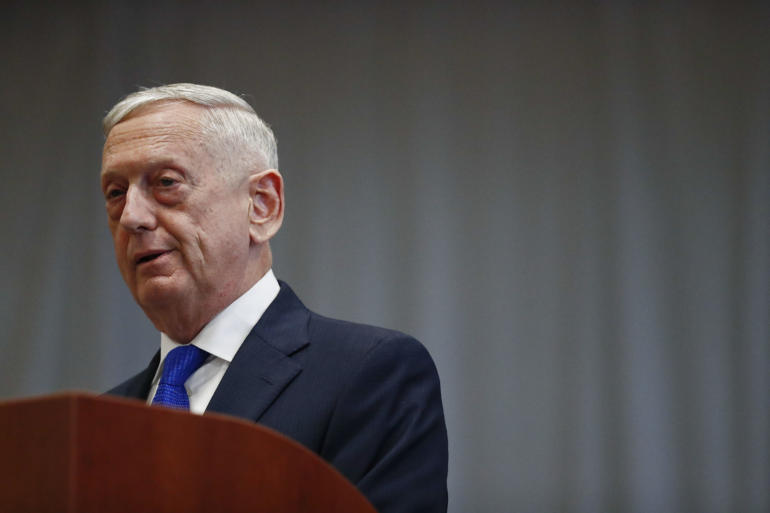U.S. Secretary of Defense James Mattis has resigned his position, citing differences with President Donald Trump over respecting U.S. allies and effectively countering nations such as China and Russia, “whose strategic interests are increasingly in tension with ours.” The retired four-star Marine general ends his resignation letter by writing, “you have the right to have a Secretary of Defense whose views are better aligned with yours” before announcing his last day on the job will be February 28, 2019.
CGTN’s Jessica Stone reports.
Trump characterized Mattis’s departure as a “retirement” not a “resignation” and thanked him for his service.
….equipment. General Mattis was a great help to me in getting allies and other countries to pay their share of military obligations. A new Secretary of Defense will be named shortly. I greatly thank Jim for his service!
— Donald J. Trump (@realDonaldTrump) December 20, 2018
Mattis’s resignation comes after Trump abruptly announced plans to withdraw U.S. troops from Syria via Twitter video. Trump justified the decision because “we’ve beaten” [ISIL] “badly” and “it’s time for our troops to come home.” There are more than 2,000 U.S. Special Forces currently serving in Syria.
After historic victories against ISIS, it’s time to bring our great young people home! pic.twitter.com/xoNjFzQFTp
— Donald J. Trump (@realDonaldTrump) December 19, 2018
U.S. allies in the anti-ISIL coalition appeared caught by surprise.
A German government spokesperson said Berlin was not informed in advance of the decision to withdraw from Syria.
“As an ally and part of the anti-IS coalition, we would have found prior consultations with the US government on a withdrawal of US troops helpful,” said Ulrike Demmer, German Federal Government spokesperson.
French Defense Minister Florence Parly called Mattis “a partner for all occasions” and added that France does not share Trump’s assertion that “the territorial caliphate (of ISIL) has been annihilated.”
A co-chair of the Syrian Democratic Council, the political arm of the Kurdish-led Syrian Democratic Forces, Ilham Ahmad, said Kurdish fighters may have to leave if Turkey attacks and has already asked Paris to provide additional military and political support “in the region until a political solution is reached.”
Mattis and other White House officials reportedly tried to convince Trump to maintain a troop presence in both Syria and Afghanistan.
In addition to the Syria withdrawal, the Trump administration reportedly is preparing to withdraw nearly half of its troops currently stationed in Afghanistan. The Wall Street Journal first reported Thursday that more than 7,000 US troops would begin returning home in the coming weeks, the beginning of a phased draw-down of a 17-year war that U.S. President Donald Trump campaigned against.
While Afghan officials were reportedly surprised by the reports, Haroon Chakhansuri, spokesman for President Ashraf Ghani, said the withdrawal would not affect overall security because the role of U.S. forces has been to assist and advise Afghan troops.
“Of course, we need to look at what will happen in reality,” said Russian Presidential spokesperson, Dmitry Peskov. “Let’s recall the previous US president and those promises concerning the withdrawal from Afghanistan, which were made six or seven years ago, and compare them to reality. That’s why we prefer to wait patiently and analyze what is happening in actual fact.”
The White House press secretary pushed back Friday morning against the idea that Moscow was pleased at reports of the withdrawal.
“Look, the idea that Putin is happy about this is ridiculous. He’s not. This puts a greater emphasis and makes them have to actually step up and do something and do more in the region. It puts them at a greater risk,” Sarah Sanders told reporters.
Aykan Erdemir discusses the international fallout from Jim Mattis’ resignation
CGTN’s Asieh Namdar spoke to with Aykan Erdemir, a former member of the Turkish Parliament who is currently a senior fellow at the Foundation for Defense of Democracies, about why Mattis’ resignation is so shocking.
 CGTN America
CGTN America
 U.S. Secretary of Defense James Mattis speaks during a change of command ceremony at the n U.S. Southern Command headquarters on Monday, Nov. 26, 2018, in Doral, Fla. (AP Photo/Brynn Anderson)
U.S. Secretary of Defense James Mattis speaks during a change of command ceremony at the n U.S. Southern Command headquarters on Monday, Nov. 26, 2018, in Doral, Fla. (AP Photo/Brynn Anderson)
